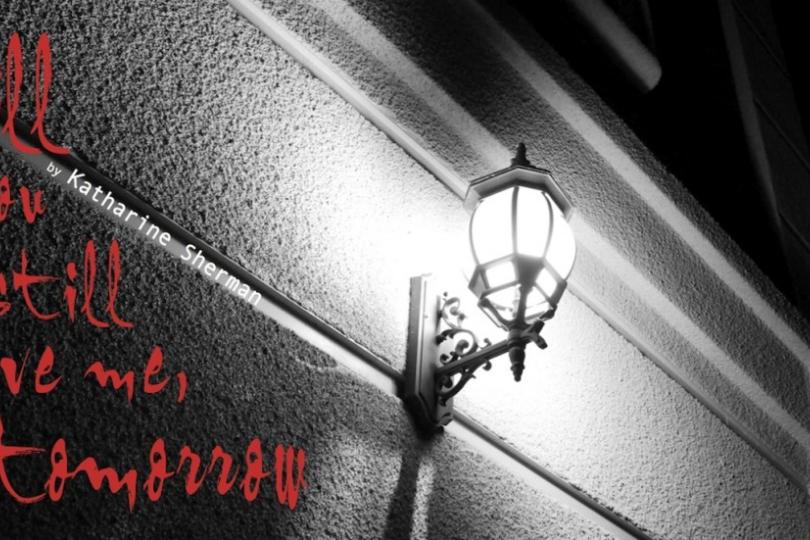Unnerving, unsettling--go see it.

When the lights dim, a man in a suit and hat starts whistling. Something about this familiar melody feels haunting in the open space, setting the mood for the rest of will you still love me, tomorrow? (inspired by Fritz Lang’s film M). Gray costumes, a wide spartan stage, and large projection screens envelope the audience in an upsetting but fascinating exploration of the potential serial killers amidst us.
This gifted ensemble, aided by musician Matt Larson, performs a nonlinear series of instances - snapshots of questions, of stories, of case studies - investigating people who kill other people.
Monologues that humanize this world of victims and victimizers blend into ensemble street corner calls, weave into choreographed song and dance--briefly isolate the resolutely calm killer amidst increasing panic--then meld into an ensemble search for the elusive killer. Thus, director Steve Busa in collaboration with his performers reveals the isolation and coldness fear infuses within cityscapes.
Playwright Katharine Sherman weaves disparate threads together, juxtaposing Little Red Riding Hood with JonBenet: her words cast a specific eye towards the fear-filled messages society presents to women, the devastating catalogue of child murders from newscasts, and the unnerving ability of violent perpetrators to camouflage themselves in a crowd.
Fascinated by horror
Paradoxically, Kevin McLaughlin’s performance as M is both terrifying and charming to the audience. His open face, apparent calm, and casual demeanor help him simultaneously blend into the ensemble and also stand apart with eerie foreboding. His whistling refrain festered under my skin as the rest of the ensemble embodied the growing paranoia that colored this nameless cityscape. Even as he, clearly the villain in this story, stands at a table and dips his hands into a bucket of blood, his quiet charm and studious eyes counteract the visceral disgust I had anticipated: instead of horrified, I am fascinated.
At one point, M casually collects a red balloon, then strolls upstage of the large projection screens. McLaughlin’s dark silhouette, identifiable only by that vexing balloon, stands unobtrusively but also horrifyingly mundane. Faceless and featureless, his shadow reduces his character to an archetype of a mild-mannered, unspectacular, pleasant-seeming stranger with an eye for luring the vulnerable. Later, the silhouette of the Big Bad Wolf later appears on the screen, also tauntingly holding that same red balloon string--this time with big teeth and eyes.
Throughout the performance, the audience is forced to draw uneasy connections: lists of children’s names now iconified in desperate attempts to federalize child protection--Megan’s Law, Amber Alerts; the barrage of television shows that serve as odes to the gruesome capacity for harm within each of us (like Dexter, Law & Order); and a quick critique of the conflation of the “emotionally disturbed” with child murderers.
Eerie simplicity
Liz Josheff’s bleak and disjointed projections of cityscapes situate and heighten the dreary anxiety produced by such tragic subject matter. As periodic street corner callers, Miriam Must’s aimless hocking of various drugs-- “Valium! Marijuana!”--offers a welcome chance to chuckle; Katie Kaufman aggressively selling fish similarly offers the audience a chance to breathe; and an eager Mark Benzel sells flowers for a loved one, a dead one, an honored one with poignant desperation. All the while, Ryan Colbert spins and shouts, delivering news headings that grow darker and more panicked throughout the production.
Splashes of red pop out of this world of gray: red cheeks, red flowers over a chalk outline, a red balloon held by M, and--most distressingly--that bucket of red blood. As a sense of anxiety grows, the production turns to its most distressing subject matter in its final moments: a recorded phone call detailing the behavior of an ape - a phone call believed to feature Adam Lanza, the shooter at Sandy Hook Elementary School in Newtown, CT.
Ultimately, this production is a surprisingly engaging exploration of a very grim topic. It will leave you unnerved - but contending with good questions of perceived guilt, performed danger, and gendered fear. It. Maybe take a friend. Maybe grab a drink afterwards. And maybe keep an extra eye out for an unremarkable-looking character on your walk home.




